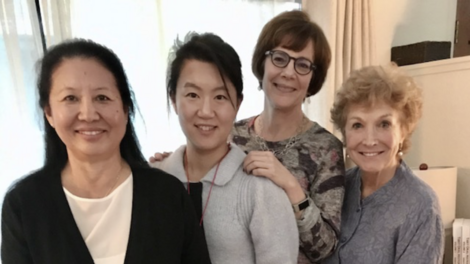
Pierless Bridges
The Joan and Ralph Lane Center for Catholic Social Thought and the Ignatian Tradition
Bridging Data Science With Ignatian Spirituality

As an alumnus of Sogang University, a Jesuit University in South Korea, I was thrilled to join the University of San Francisco to connect my teaching and research with the Jesuit mission of social justice. In 2018, I participated in Western Conversations: University Partnerships with the Social Ministries of Jesuits West and had a chance to share my passion to connect Data Science with the university’s Jesuit mission with Kathleen Coll, a faculty member in the department of politics.
A few weeks later, Kathleen connected me with Kathy Nasstrom in the department of history who encountered a “big” data problem. Kathy has been working on the Tibet Oral History Project (TOHP). Over 11 years (2006–2017), TOHP recorded, translated, and transcribed 304 oral history interviews with Tibetan elders living in exile, the last generation who had inhabited an unoccupied Tibet. Coding topics on over 7,000 pages of interview transcripts required a customized tool for the TOHP team to minimize coding time and coordinate with members who are remotely located. For a data science faculty, this was a “small” data problem, and I could quickly create a cloud-based web application, receiving great advice, vision, and purpose of the application from the TOHP team.
When the application was ready, we invited Tenzin Yangchen to code the interviews from India with support from a Jesuit Foundation Grant. When all four of us — Marcy Adamski (the founder and director of TOHP), Kathy Nasstrom, Tenzin Yanchen, and I — had a meeting in January, they mentioned that it would take approximately three years to finish coding, writing chapters, and publishing a book. I was surprised that it could take decades to collect data and write an oral history book. Another part of me felt concerned about the sustainability of projects such as this one. When students from China found out that I was working on a Tibet-related project, I received a threatening email that made me revisit the idea of working on a politically sensitive subject and that delayed our progress. I realized that working on an oral history book about a vulnerable population or politically sensitive topic could be simplified and accelerated if a computer can learn from human experts — how they map sentences with certain topics and rate the relevance. Unfortunately, I was still not confident to talk out loud about the fact that I am working on the TOHP and not sure how much longer I could do this.
This year, I received the Ignatian teaching and research fellowship and participated in discussions, learning more about Ignatian traditions. During my turn to share my current and future research, I shyly shared the project that I have been secretly working on and the next project I am longing to do — an automated topic extraction using machine learning and deep learning for oral history projects. I also shared my anxiety about working on this project and the possibility of future confrontations. However, everyone in the room was supportive of the fact that I am working for social justice and truth as a computer scientist. Their encouragement surprised me and gave me much pride.
I am working for social justice and truth as a computer scientist.
Yes, I am planning to spend my summer in front of the computer to write a program for those who bravely fought for freedom.
DIANE WOODBRIDGE is an assistant professor in the master of science in data science program at the University of San Francisco. She is also an Ignatian Teaching and Research Fellow at the Lane Center. Her research interests include database management systems, data fusion and machine learning in various domains including wearable IoT, biomedical, geospatial remote sensing, and now oral history.
